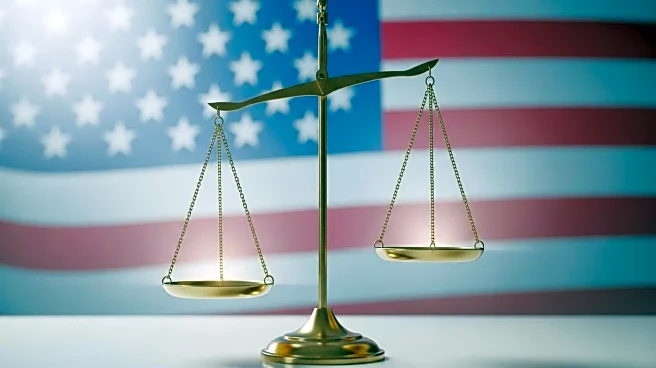What's Happening?
A recent Yahoo/YouGov poll reveals a decrease in the number of Americans who believe the U.S. will cease to be a democracy in the future. Conducted from September 25 to September 29, 2025, the survey included 1,676 U.S. adults and was released amid a government shutdown and following the assassination of conservative activist Charlie Kirk. Compared to June 2022, during the contentious January 6 hearings, fewer Americans now predict the end of U.S. democracy or the likelihood of a civil war. The poll shows a 5-point drop in those who believe America will cease to be a democracy, from 49% to 44%, and a similar decline in those anticipating a civil war, from 46% to 41%. The shift is largely attributed to increased optimism among Republicans, with significant drops in their predictions of democracy's end and civil war likelihood. The survey also indicates a decrease in tolerance for political violence, with fewer Americans justifying physical violence, assassination, or taking up arms against the government.
Why It's Important?
The poll's findings suggest a shift in public sentiment regarding the stability of U.S. democracy, which could influence political discourse and policy-making. The decline in fears about democracy's future may reflect a broader sense of political stabilization, despite ongoing controversies. This change in perception could impact voter behavior and engagement, potentially affecting upcoming elections and legislative priorities. The reduced tolerance for political violence indicates a possible move towards more peaceful political engagement, which could foster bipartisan dialogue and cooperation. However, the persistent belief that the country is on the wrong track highlights ongoing challenges in addressing political polarization and societal divisions.
What's Next?
The poll results may prompt political leaders to reassess their strategies and rhetoric, focusing on unity and stability. As the government shutdown continues, there may be increased pressure on lawmakers to resolve budgetary disputes and restore public confidence in governance. The decline in fears about democracy's future could lead to renewed efforts to address underlying issues such as electoral integrity and political polarization. Additionally, the assassination of Charlie Kirk and the suspension of Jimmy Kimmel may influence public discourse on political violence and free speech, potentially leading to legislative or policy changes aimed at safeguarding democratic principles.
Beyond the Headlines
The poll highlights the complex interplay between real-world events and public perception, suggesting that context and recent developments significantly influence political attitudes. The assassination of a prominent conservative figure and the suspension of a liberal media personality underscore the volatile nature of political discourse in the U.S. These events may catalyze discussions on the ethical and legal boundaries of political activism and media freedom. The poll's findings also reflect broader cultural shifts, with Americans increasingly viewing political opponents as misguided rather than threatening, which could pave the way for more constructive political engagement.








